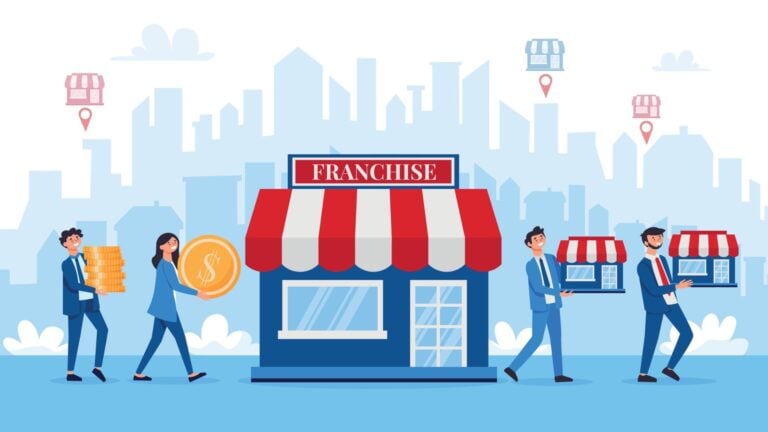Franchising is a popular business model that provides business owners with an existing business plan, expert support and training, and brand awareness. We break down the ins and outs of franchises in our guide below.
Franchising is a widely used business model that can prove very successful when done right. It enables individuals and entrepreneurs to start their own businesses with the support and guidance of an established brand.
But how exactly does a franchise work? And is it the right business model for you?
Here, we explore everything to do with franchising, including its pros and cons, how to start your own franchise business, and more. Whether you’re simply curious about franchises or looking to start your own, this article will give you the information you’re after.
Key Takeaways
- Franchising gives people the opportunity to start a business with the backing of an existing brand.
- Franchise owners (franchisors) help franchise buyers (franchisees) start their business. This usually comes in the form of initial training, ongoing guidance, and a clear, tested business model.
- In return, franchisees pay licensing fees and/or royalties to the franchisor.
- Anyone can open a franchise. Startup costs are often lower than they would be to open your own business, and you don’t need any special skills for most opportunities.
How Do Franchises Work?
A franchise business model refers to the licensing of a brand, products, or services to a third-party operator. This operator is known as the franchisee and is responsible for the day-to-day management of their franchise business. Many of the brands you know and use every day are franchises. Think McDonald’s, Anytime Fitness, 7-Eleven, Subway, and more.
Franchises work by providing people with the opportunity to start a business under a known brand. These people (the franchisees) pay fees to the franchise owner (the franchisor) to be able to use the brand and other resources.
Usually, this includes an initial franchise fee and ongoing royalties. These usually come in the form of a percentage of the franchisee’s revenue or profit.
🧠 Did You Know?
The amount of royalties franchisees must pay to franchisors varies by industry and can range between 4.6% and 12.5%.
In return, the franchisee gets support and guidance from the franchisor. This includes initial support to get their business up and running, along with ongoing training and advice. They may also receive resources such as operating manuals and other educational materials.
Some franchise contracts include equipment and training on how to use it, which can add a significant amount to the initial cost. The franchisee will also have to follow any franchise rules, which could cover anything from advertising to prices and menu items.
Franchise agreements
One of the most important parts of investing in a franchise is the franchise agreement. This outlines all the terms and conditions of the franchisee and the franchisor’s business relationship. It details what the franchisee gets and how much they must pay, as well as other franchising requirements. These agreements vary greatly, so it’s important to go through them carefully.
Franchise agreements usually last for 5-30 years, although this can vary. There may be penalties for breaking an agreement early.
The Federal Trade Commission requires franchisors to provide a Franchise Disclosure Document to franchisees. This must include information about risks, limits, benefits, and more. Franchises are also regulated on a state level in the US.
The Advantages of Franchises
Purchasing a franchise has numerous advantages over starting your own business from scratch. It’s easier for small business owners, you’ll get support and guidance from the franchisor, and you’ll know exactly what goods and services to sell.
Here are a few of the top advantages of franchises.
Established brand name
Instant brand recognition is one of the best things about the franchise system. Established and popular brands can be leveraged to help you attract customers from day one.
A clear business model
When you buy a franchise, you gain access to a clear, proven business model. This will help you understand exactly what you need to do to run a successful franchise business.
Franchisor support and guidance
You’ll also benefit from franchisor support throughout your franchising journey. This comes in many forms, but franchisors typically provide comprehensive initial training and ongoing support. This can help franchisees feel more confident and comfortable with the day-to-day pressures of running a business.
Included marketing and advertising
Finally, many franchise offerings include various marketing and advertising perks. As a franchisee, you’ll benefit from the franchisor’s corporate headquarters running larger marketing campaigns, instead of having to do it yourself.
💡 Pro Tip:
Business management tools like Connecteam can help you succeed by providing everything you need to run your business in one central platform.
You can handle employee scheduling and communication, task management, time tracking, digital forms, and more, allowing you to run your franchise efficiently.
Get started with Connecteam for free today!
The Disadvantages of Franchises
A franchise business model can have its disadvantages, including:
High startup costs and ongoing fees
Franchises, like any business, often cost a lot to get up and running. Your budget will need to include room for franchise licensing fees, along with any costs for real estate, equipment, stock, and more.
On top of this, by definition, the franchise model may require you to pay a percentage of your revenue or profit to the franchisor. This can become quite a drain on your profits if your franchise isn’t as successful as you hoped.
📚 You May Be Interested In:
Read more about 20 Franchises Under 10K You Can Start in 2024
Compare and read more about the top tools for your franchise business:
Limited creativity and flexibility
Another issue with franchising is that you’ll have limited flexibility and creativity in the way you run your business. In almost all cases, you have to use company branding and follow a set of guidelines.
This can include decision about the goods or services you can sell, your franchise’s layout and design your employee uniforms and even the suppliers that you can use and your pricing structure.
Limited potential for expansion
It can also be difficult to expand if you decide to go down the franchise route. With a traditional start-up, you can open new locations or move to a larger store whenever you want to. However, franchise agreements will often prevent you from doing this, which means that ongoing growth can be difficult.
Franchises vs. Start-ups
An entrepreneur who wants to start a business can choose either the start-up or the franchise route. Both are viable business models, but they’re quite different.
Franchises are built on an established brand and business name, providing business owners with a strong foundation and regular training and support. This makes them an attractive option for people without much experience or a strong business skill set. In general, franchises suit those who want a safe option and those starting their first business.
With start-ups, business owners have complete control over how their business looks and operates. This enables them to innovate and experiment with different business models—but it also comes with a much higher chance of failure. Because of this, start-ups are generally best suited to those with a strong understanding of business planning and management.
Read more about The Advantages and Disadvantages of Franchising You Must Know
Becoming a Franchisee
Once you’ve decided to go down the franchise track, you’ll have a lot of decisions to make. There are thousands of franchise opportunities for prospective business owners to choose from—fast food, restaurants, clothing brands, gyms, hardware stores, and more.
Here are 3 of the most important things to keep in mind when you’re thinking about starting a new franchise business.
Decide what you want to do
Think carefully about exactly what sort of business you want to run. Choosing something you enjoy will make your life easier and make business success more likely.
For example, if you’re a foodie, you might like to open a restaurant or fast food outlet. More hands-on? Maybe a lawn mowing or handyman business would be more your thing. You might even want to buy a gas station franchise.
Not really sure what sort of franchise business you want to run? We’d recommend doing more research. Search on Google for “popular franchising opportunities” or “top franchising opportunities for 2025.”
Chances are that a few of them will catch your eye. You can then research them further and see which one interests you most.
Most franchise agreements require you to commit for 5 or more years, so it’s especially important to take your time researching and thinking about the right option.
💡 Pro Tip:
It’s equally important to know where you want to open your business. Areas where there aren’t many (or any) existing franchisees present less competition and a higher chance for success.
Consider your skills
It’s also important to think carefully about the skills you have. Any qualifications or trades you have may come in handy.
Let’s say, for example, that you’re a qualified nutritionist. Opening something like a health-food store or health-focused cafe will give you a chance to use these skills to build your business.
Some franchises require you to have certain skills before you can become a franchisee, so be certain to research requirements thoroughly.
Analyze potential franchisors closely
Next, start researching potential franchisors and ensure they’re fair, ethical, and suitable for your needs and goals.
Start by searching online for franchisors in the industry you’ve chosen. For example, if you want to buy a fast food franchise, search for “top fast food franchises in the US.” You’ll find a list of fast food establishments that are franchisors—for instance, Burger King, Wendy’s, and McDonald’s.
Note these franchisors down and begin doing research on each one. Run Google searches for reviews from existing franchisees to get an idea of how fairly the franchise is run and how franchisees are treated.
Additionally, browse each franchisor’s consumer-facing and corporate websites. These will include information about the company’s goods and services, as well as their history, business practices, mission, and franchising opportunities. You may even find information on the franchisor’s finances, stock status, and stance on diversity, equity, and inclusion.
After researching, narrow down your list to a few top options. Get in touch with the franchisor’s corporate team to learn more about how to franchise with them. Wendy’s, for example, has a dedicated page for prospective franchisees and a digital form they can fill out in just a few minutes.
Once you hear back, consider the information and choose a franchisor based on how closely they align with your business goals, what they can offer you, and what makes the most sense for your unique situation.
Review and sign the franchise agreement
Next up is the franchise agreement, which outlines the legal terms and conditions of your partnership.
Pay careful attention to any caveats included in the franchise agreement, and ensure you understand exactly what’s required of you before you sign. It’s often worth consulting a business lawyer to ensure the terms are fair and legal.
💡Pro Tip:
Red flags to look out for include fees that are higher than similar franchises, poor territory protection, and a lack of ongoing support from the franchisor.
Summary
Franchising is a popular business model that lets entrepreneurs start their own businesses with help from an established brand. Franchisees have to pay fees to the franchisor, including up-front licensing and equipment costs and ongoing royalties. In return, franchisees benefit from increased exposure, a tried-and-tested business model, and ongoing support and training.
At the end of the day, franchising has fewer risks than traditional start-ups, making it a popular option for new entrepreneurs and first-time business owners.




